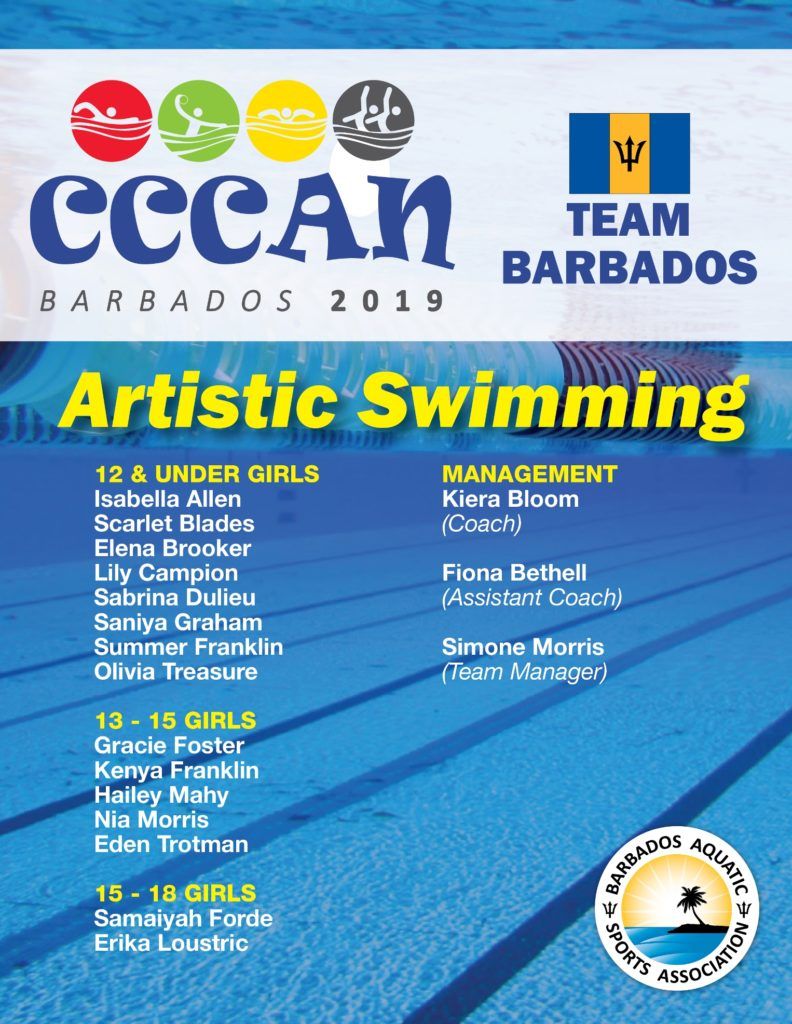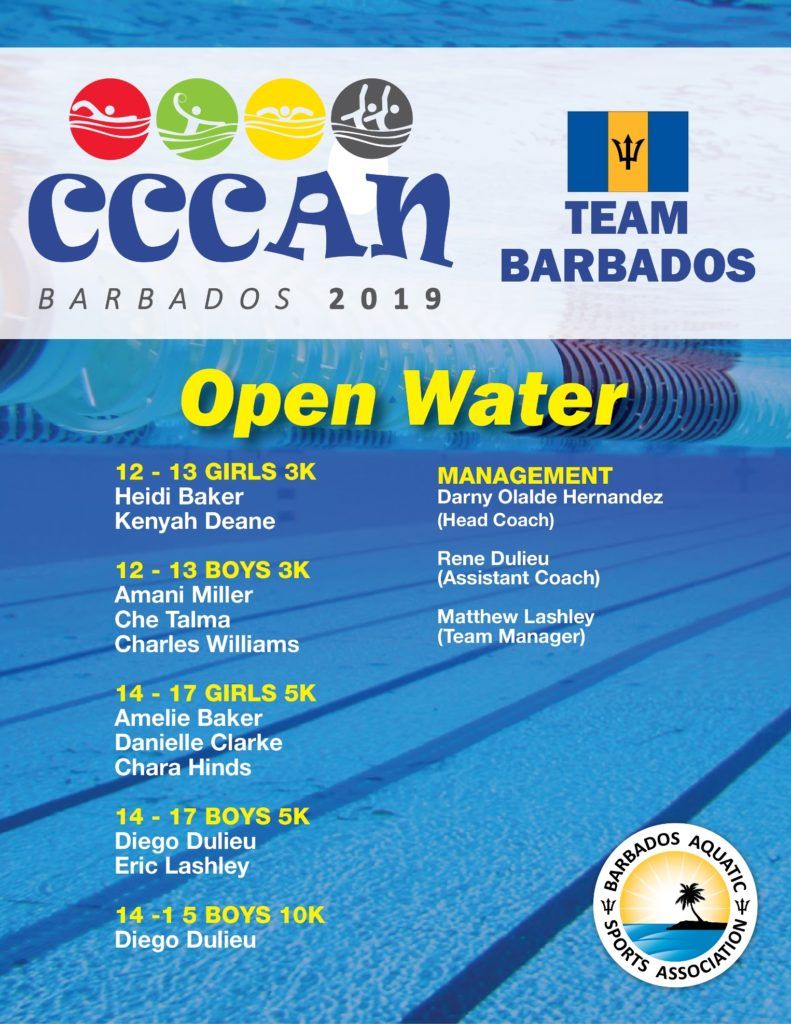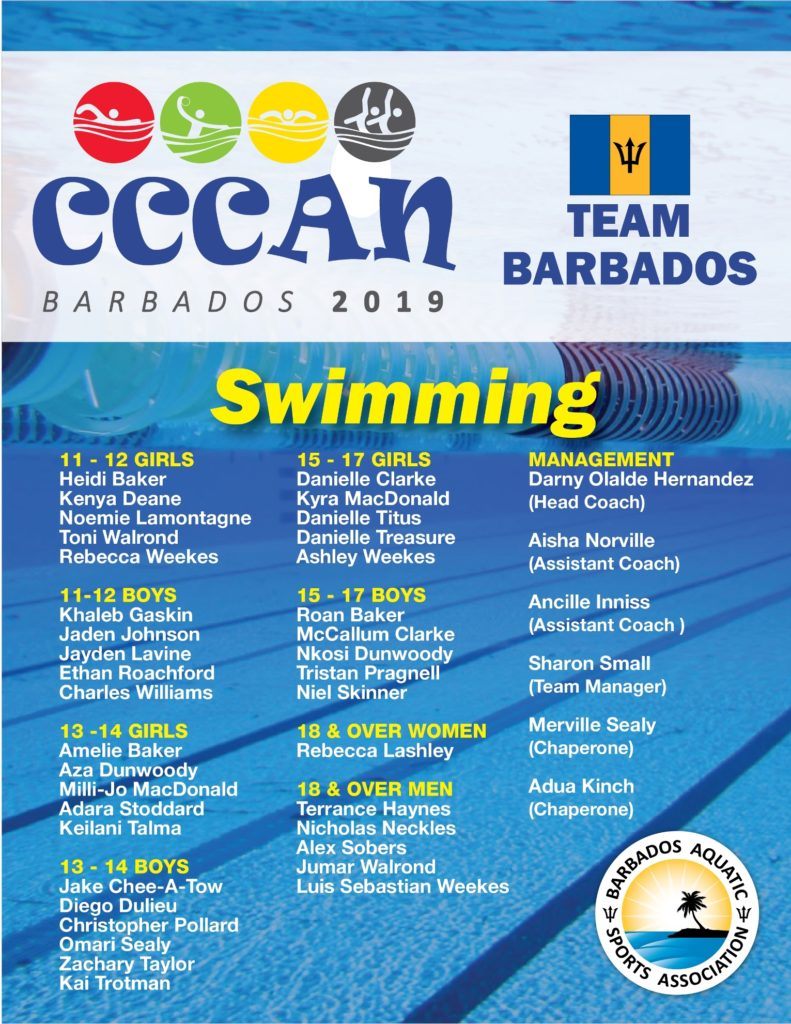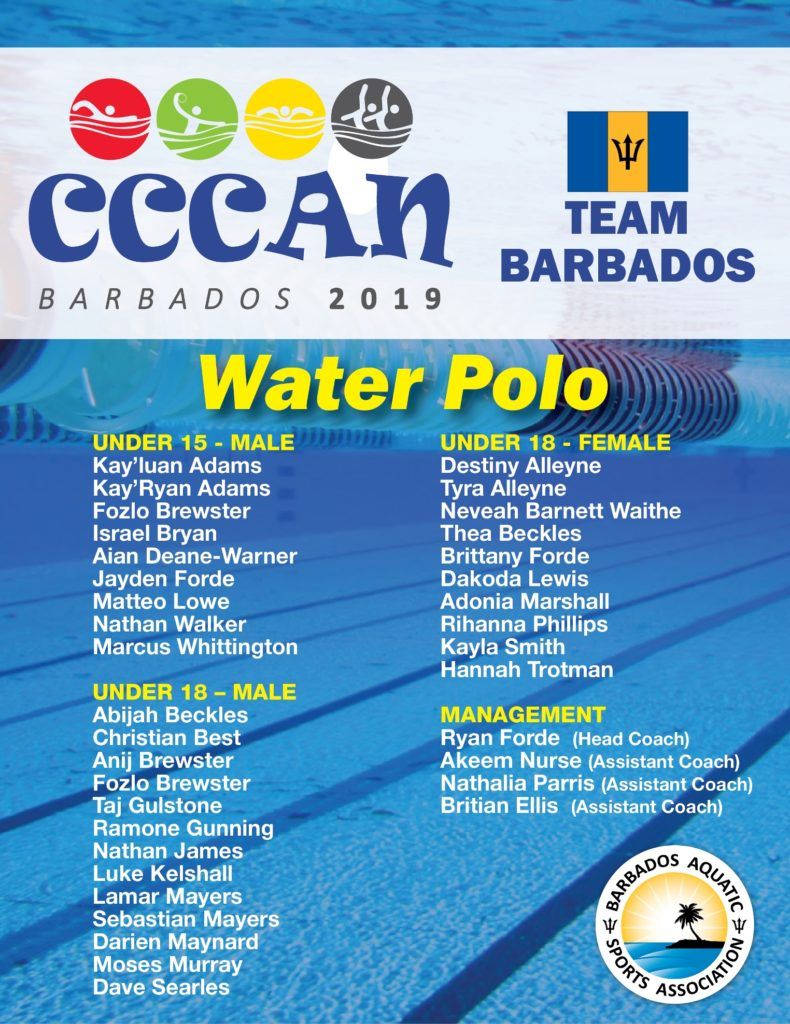


Barbadian 2020 Olympic Team Announced

Danielle Titus

Alex Sobers

Carifta Aquatics Postponed
As Barbados and other countries across the region continue to grapple with the effects of the ongoing Covid-19 Pandemic, a decision has been made by the Barbados Aquatic Sports Association (hosts for the event) to postpone Carifta 2021.
Scheduled to take place from March 26th – April 7th, it was agreed that new dates would be decided upon after the “national pause”- lockdown that is expected to end on February 17th, and after BASA has had an opportunity to meet with the COVID-19 Monitoring Unit to determine suitable health and safety protocols.
We regret the inconvenience this will cause across the region, and encourage everyone to continue to follow all health and safety protocols: SANITIZE. WASH HANDS. SOCIAL DISTANCE.
We look forward to working together to make Carifta 2021 a safe and enjoyable event for all.

Pool Closure
Dear Members,
Due to the extension of the “national pause”- lockdown, the Aquatic Centre will remain closed until February 28, 2021 in keeping with the directive given by the Prime Minister in her address to the nation on February 15, 2021.
Please continue to be safe and follow all government protocols which are designed to keep us safe by stopping the spread.
Let us be our brothers’ and sisters’ keeper as we continue to navigate these most trying times.
BASA looks forward to the resumption of aquatics training and welcoming everyone back as soon as the all clear is granted.
Cheryl, Lady Forde
President
Barbados Aquatic Sports Association

Nicky Neckles, the Barbadian Master
To those long-standing members of the regional competitive swimming community, the name Nicky Neckles is well known and deeply revered. Without a doubt one of the best backstroke swimmers to come out of Barbados (and the Caribbean at large), Nicky’s achievements and records as a junior and senior swimmer at Carifta, CCCAN, CISC, CAC Games, PanAm Games, Commonwealth Games and ultimately 3 Olympiads (1996, 2000, & 2004) have set an extremely high bar for upcoming generations of swimmers to meet.
Having “retired” from competitive swimming after the CAC Games in 2010, (25 years following his first Learn to Swim class at Casuarina Hotel), it seems that the water will forever call his name. After a 10 year hiatus from the pool, Nicky is now in training to represent himself and Barbados at the 18th FINA World Masters Championships in Guanjgju, South Korea, in August 2019. As part of his preparations, the 40 year old took aim at the 40-44 Age Group World Masters Records in the 100m backstroke (59.08) and 200m backstroke (2:10.57), and while competing on home soil as part of the Barbados Team at CCCAN 2019, Nicky clocked 59.52 in the 100m backstroke (a near miss on the record, but a bronze medal nonetheless) followed by a glorious 2:09.08 in the 200m event. A gold medal performance and a new World Masters Record!
To see the faces of our young swimmers as they tried to comprehend the enormity of what they had just witnessed, it occurred to me that they really have no idea who this man is, and what he represents to their sport. It was time to educate them!
I asked Nicky if he would be willing to share a bit about his journey in swimming, and he was gracious enough to provide some insight. While every swimmer’s path and experience is different during their competitive life in the water, it’s always beneficial for upcoming generations to listen and learn the stories of the greats, so they themselves can truly understand exactly what it takes to be one of the best!
Read more about Nicky’s earlier career in this article, written by Sonia O’Neal, at the time of his initial retirement in 2010.

Tell us a bit about your early years in swimming. How were you introduced to the sport and what was the transition into the competitive side of things like?
“I was terrified of the water as a child growing up. At the beach I wouldn’t go in the water without my life jacket. At swimming lessons I was the one that the instructor had to have the pole ready for to grab on to, when I got scared swimming 1 length of the pool – while the other swimmers were moving along confidently.
I had an awful boat ride in the Grenadines one vacation. Rough seas! After that experience apparently I told my parents I wanted to learn to swim when I got back to Barbados. That’s when I joined Stingrays Club.
Swimming after that came naturally.”
As you began to make your mark on the junior competitive scene in Barbados and throughout the Caribbean, how did your training schedule evolve? How did you balance the pool, school, friends, family, etc.?
“As I began to progress morning training was introduced. So there were more hours spent in the pool. But I remember having a good balance between social life and training. I never felt I was missing out on anything.”
From what age did you start morning training? And how many sessions a week were you at? Were you also involved in other sports?
“From about age 9-10. I think we swam 5 or 6 total sessions. By 14 I was doing 10 swimming sessions per week. I also did karate and track ‘n field in the first 2 years of secondary school.
I wasn’t a bright student at primary school. But as I began to improve and develop in swimming, my ability to focus also improved, and I became disciplined with my studies by secondary school. Louis Lynch! There especially I learned to be well-rounded. I had great teachers and friends there!”
Can you tell us a bit about your move from living and training in Barbados to attending university in Scotland? What made you decide on the University of Stirling?
“Moving away was easy and exciting! I choose Stirling because there was an excellent American coach, Chris Martin, heading the program, who trained some excellent American backstrokers at the time. Also because I wanted to study economics.”
Did they seek you out, or was the move initiated more from your end?
“From my end. I had interest from Auburn University and University of Kentucky (these are the ones I remember).”
How did the training regime in university (and on the international scene in general) differ from that in Barbados?
“The biggest difference in training is the level of competition. There are guys better than you. So you have to keep up. Also the attention to technique is greater. Plus gym work for strength jacks up!”
What are some things that the local swimming community could learn from other countries?
“The biggest thing we can learn from other countries is to focus on the technical side of swimming. Like starts, turns and underwater kicking. In Barbados I think coaches say “go faster” or “give more effort”. But I don’t hear many coaches saying how to do that.
For instance: You need to do dolphin kicks underwater. Yeah, but how? How do you do it effectively and fast?”
As with all competitive sports, I’m sure during the course of your journey leading up to the Olympics there were major hurdles and obstacles to be overcome. Can you describe some of these, and what the process was like moving past the disappointments and tough times?
“There were many disappointments! But the biggest and most common is not improving. After my first Olympics in 1996 I didn’t improve until the next Olympiad 4 years later. And it’s not because I wasn’t training hard!
I got over that by analyzing myself, and in many ways, becoming my own coach. And it’s probably why my profession is financial analysis. The first thing I did was stop focusing on the time I wanted to do. Instead, I focused on improving my distance per stroke. If I can do a 50m in 30 seconds taking fewer strokes than before, it means I am more efficient in the water.
Not worrying about times also removed unnecessary pressure and I began to enjoy swimming again.”
What role has goal-setting played in your swimming career? Can you tell us a bit about the planning process at the beginning of the year or competition season?
“Goals were set at the start of every year, and were based on the major competitions for that year. But throughout the year you set different milestones to measure progress. For instance, in December of last year when I decided to compete in the World Masters in August 2019. I knew I would do at least 2 meets before. The first meet is a gauge and at the second you want to improve further.”
What role do you think parents play in the development and support of a swimmer who’s showing potential and desire within the sport?
“Parents are critical. They can make or break an athlete! Their toughest job (other than financial support) is knowing when to back off, and knowing when to push. And also to not get ahead of themselves. A 10 year old child, no matter how fast, is a long way from being in the Olympics. So it (swimming) should be enjoyable.”
Tell us about your move into Master’s swimming? What was it that prompted the move, and what is it that you’re hoping to accomplish?
“I got into masters swimming because of Terrence Haynes. A former Olympian himself, he invited me to swim at his pool. We did some sessions and raced each other once or twice. Then he came up with the brilliant idea.”
So you had taken a break from competitive swimming once your working career began?
“Yes I haven’t been in a pool for 10 years.”
Oh wow! I guess it’s like riding a bike then.
“It’s really not supposed to be. Maybe for me it’s like that. But I’ve always been active in some way. The last 4 years I’ve been doing CrossFit.”
Over the next 20 years what role do you see yourself playing in the local and regional swimming community? Masters competitor, mentor, coach?
“My role over the next 20 years? I cannot say. I believe now I will play some role, just because I seem to always find my way back to the pool, even after I’ve said “that’s it”.”
It’s a 200m Backstroke final. What goes through your mind as you stand behind the blocks, preparing for the referee’s whistle? What are the thoughts before, during and after the event? Is it the same at 40 years old, as it was when you were 22?
“Nothing goes through my mind before a race. It’s blank. I look down the center of the pool and take deep breaths. It was that way from age 13 to 18. Then I lost it for four years by clouding my mind with thoughts of times and performance. During the race I am just aware of the competition around me but I swim my own race and at my own pace.”
What words of advice do you have for the 18 year old swimmer (and his family), who has dominated the local and Caribbean swim scene, but is looking to transition to the college and university circuit?
“My advice to an 18 year old is to go to a university where you are wanted. Not to one where they don’t really need you.”
What is/are your least favourite part(s) of competitive swimming? Conversely, what is your most favourite part?
“Cold water is my least favorite thing about swimming. My favorite thing is playing with my technique to make subtle improvements, after watching YouTube videos.”
How important do you think swimming (and sports in general) is to young people?
“I think everyone should learn how to swim as a life skill. Sport in general is such great outlet for young people to express themselves and to learn valuable life lessons, such as perseverance, discipline & accepting constructive criticism.”

Looking back on your swimming career and all of your accomplishments within the sport (not saying that there aren’t more to come) what is it that you are most proud of?
“The accomplishment I am most proud of are my first gold medal at Carifta in 1991; my first gold medal at CCCAN in 1993; winning my heat races at the Olympics in 1996; winning 3 gold medals at Central American Games; finishing 4th at the Commonwealth Games; making the semi finals at the World Championships; and now breaking a Masters World Record at home!
That’s not all, but these are the ones most important to me.”
If you could be granted 3 wishes for swimming in Barbados, what would they be?
Wish 1. An Olympic medal.
Wish 2. Another 50m pool to accommodate the numbers we have now .
Wish 3. Our own elite college system so we wouldn’t have to borrow others.



Team Barbados for CCCAN 2019
The Barbados Amateur Swimming Association is pleased to announce our National Team for CCCAN 2019! Our heartiest congratulations to the athletes representing Barbados in Water Polo, Artistic Swimming, Open Water & Swimming!
Dates of Competitions:
SWIMMING: June 28th – July 2, 2019
ARTISTIC SWIMMING June 24 – 27, 2019
WATER POLO: July 4 – 8, 2019
OPEN WATER: July 3 & 5, 2019




